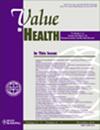Choice Consistency in Discrete Choice Experiments: Does Numeracy Skill Matter?
IF 4.9
2区 医学
Q1 ECONOMICS
引用次数: 0
Abstract
Objectives
This study investigated the relationship between numeracy skills (NS) and choice consistency in discrete choice experiments (DCEs).
Methods
A DCE was conducted to explore patients’ preferences for kidney transplantation in Italy. Patients completed the DCE and answered 3-item numeracy questions. A heteroskedastic multinomial logit model was used to investigate the effect of numeracy on choice consistency.
Results
Higher NS were associated with greater choice consistency, increasing the scale to 1.63 (P < .001), 1.39 (P < .001), and 1.18 (P < .001) for patients answering 3 of 3, 2 of 3, and 1 of 3 questions correctly, respectively, compared with those with no correct answers. This corresponded to 63%, 39%, and 18% more consistent choices, respectively. Accounting for choice consistency resulted in varying willingness-to-wait (WTW) estimates for kidney transplant attributes. Patients with the lowest numeracy (0/3) were willing to wait approximately 42 months [95% CI: 29.37, 54.68] for standard infectious risk, compared with 33 months [95% CI: 28.48, 38.09] for 1 of 3, 28 months [95% CI: 25.13, 30.32] for 2 of 3, and 24 months [95% CI: 20.51, 27.25] for 3 of 3 correct answers. However, WTW differences for an additional year of graft survival and neoplastic risk were not statistically significant across numeracy levels. Supplementary analyses of 2 additional DCEs on COVID-19 vaccinations and rheumatoid arthritis, conducted online, supported these findings: higher NS were associated with more consistent choices across different disease contexts and survey formats.
Conclusions
The findings suggested that combining patients with varying NS could bias WTW estimates, highlighting the need to consider numeracy in DCE data analysis and interpretation.
离散选择实验中的选择一致性:计算能力重要吗?(VIH-2023-0494.R2)。
研究目的本研究调查了离散选择实验(DCE)中计算能力与选择一致性之间的关系:在意大利进行了一项离散选择实验,以探讨患者对肾移植的偏好。患者在完成离散选择实验的同时回答了三个算术问题。采用异方差多项式Logit(HMNL)模型研究计算能力对选择一致性的影响:结果:计算能力越高,选择一致性越大,量表增加到 1.63(p结论:研究结果表明,将不同计算能力的患者组合在一起,可以提高选择一致性:研究结果表明,将具有不同计算能力的患者合并在一起可能会使WTW估计值出现偏差,这突出说明了在DCE数据分析和解释中考虑计算能力的必要性。
本文章由计算机程序翻译,如有差异,请以英文原文为准。
求助全文
约1分钟内获得全文
求助全文
来源期刊

Value in Health
医学-卫生保健
CiteScore
6.90
自引率
6.70%
发文量
3064
审稿时长
3-8 weeks
期刊介绍:
Value in Health contains original research articles for pharmacoeconomics, health economics, and outcomes research (clinical, economic, and patient-reported outcomes/preference-based research), as well as conceptual and health policy articles that provide valuable information for health care decision-makers as well as the research community. As the official journal of ISPOR, Value in Health provides a forum for researchers, as well as health care decision-makers to translate outcomes research into health care decisions.
 求助内容:
求助内容: 应助结果提醒方式:
应助结果提醒方式:


